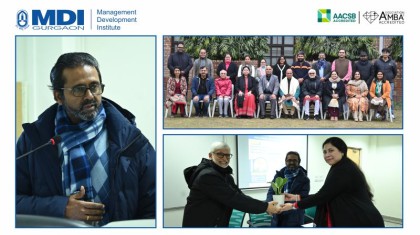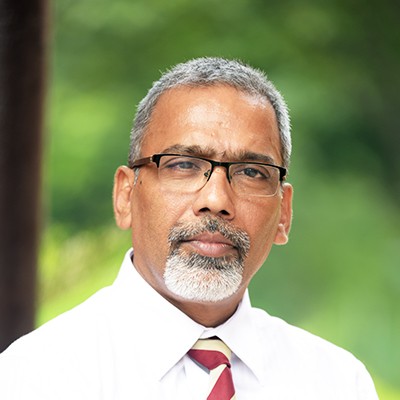Centre for Indian Thought and Management
Indian management education has mostly adopted the North American model of education. North American MBA programmes are attempting to regain the value and relevance of management education through curricular changes. If both management and its education matter, then management practice, as well as management education in India, need to reflect elements that are relevant for India. As a craft, there would be no better time to work on the Indian way of management; as a science, there would be no better time to develop indigenous theories.
An example may illustrate how Indian perspectives may be relevant for both the theory and practice of management. Modern economic models are rooted in the assumption that consumption generates happiness. Therefore, promoting higher levels of consumption along with augmenting income opportunities may be a way to overall happiness. Indian economic thought has a different take on this issue. Chanakya says that economic prosperity is essential because it sustains the practice of dharma (dharmasya mulam arthah) that, in turn, generates happiness (sukhasya mulam dharmah). Economic prosperity without moral soundness cannot lead to happiness. This worldview requires little justification for the importance of ethical and sustainable business practices. It also calls for management theories that are based on morally sound assumptions (Ghoshal, 2005).
Indian thought is a rich source of generative knowledge. It can be leveraged for developing theories for management and related disciplines. The Indian thought system emphasises on the means used to achieve a goal, rather than the goal itself. Consequently, if the means to achieve the goal are refined, excellence will naturally manifest itself in the ultimate result. Some of these Indian thoughts include classical literature such as Vedas, Purana, Ramayana, Mahabharata, Gita, various systems of Indian philosophy, Arthasastra, Tirukkural, etc. These texts are generally in Sanskrit and other classical Indian languages. These texts offer rich insights on governance, vision, leadership, motivation, economic thought, management control, work-excellence, goal-setting, decision-making, planning, social responsibility, ethics, achieving financial success and various other aspects of management and administration. Management is an interdisciplinary field and management research can leverage insights from related disciplines such as Indian Psychology (Rao & Paranjpe, 2015) which build on Indian thought as well as Indian thoughts in social psychology, sociology, political science, anthropology and economics.
Indian thought refers to systems of thinking that originated in India. They are evidence-based, synthetic, life-focused systems that use substantive logic as opposed to formal logic of West. They seek to integrate knowing, doing, and living. There is no separation of philosophy and philosopher. Hence their masters were called Acharya - one who practiced what he preached. All of them are focused on a fulfilled life and hence deeply engage with dharma. Dharma is defined as that which causes excellence, sustenance, and protection from unnecessary harm to all living beings. Dharma is not a religion e.g., Hinduism, Jainism, Sikhism etc.
For all these research-intensive activities, there is a need for a dedicated centre to work on building the knowledge base that is grounded in Indian Ethics and Ethos. The Centre would have the following objectives:
- To study Indian thoughts and wisdom
- To explore their relevance in the current management practices
- To make a comparative analysis of the Indian and Western thoughts for enabling inclusivity in organisations
- To organise research seminars/conferences/conclaves/workshops/trainings on Indian Management in India or abroad
- To develop a library on Indian Management Thoughts, publish research articles and cases in print and digital forms
The Centre would need to coordinate with scholars across the globe for efficiently developing Indian management knowledge-base. It would also need its dedicated staff for conducting research and documentation. It may function as a hub as well as a one-stop destination for India-relevant management research. It can liaison with the Indian Academy of Management for this purpose.
- Web/seminar, lecture
- National Conference/International Conference
- Round Table / Panel Discussion
- Books/Papers/Articles/Projects/Theses/Consulting and counseling/Training/Workshops
- Dr Hariniwas Tiwari, Founder of You Tube Channel, Sanskrit Sahitya and Sanskriti
- Prof Girishwar Mishra, Former VC, vice chancellor of Mahatma Gandhi Antarrashtriya Hindi Vishwavidyalaya
- Prof ES. Srinivas, IIM Bangalore
- Prof.Dipak Jain, Former Dean Kellogg & INSEAD
- Prof D.R. Bhandari, retd Prof, UPSC and Jodhpur University
- Dr.Alok Kumar, XLRI
- Mr.Ajay Mishra, DD News
- Prof Naveen Gupta, Director, Hindustan Institute of Management (SGI), Mathura
- Shri Hrishikesh Sharan, Retd IAS
- Prof Sunita Singh Sen Gupta, FMS Delhi
- Prof Sangeeta Kohli, IIT Delhi
- Prof Rajen Gupta, former Professor of OB, MDI Gurgaon
- Mr. Pradeep Sharma, Spiritual Teacher
- Prof Manjari Srivastava, NMIMS Mumbai
- Rakesh Vohra (FPM Scholar)
- Rajesh Mahapatra (FPM scholar)
- Malvika Sharma, PGDM-Exe
- Aniruddh Pareek, PGDM-Exe
Ghoshal, S. 2005. Bad management theories are destroying good management practices. Academy of Management Learning & Education, 4(1): 75-91.
Chakraborty, S. K (1980), “Management Stylistics in India- The Case for a Countervailing Ethos”, Decision, July, pp. 248-249.
Raina, M. (2015). The character of creativity: The vedic perspective. The Humanistic Psychologist, 43(1), 54–69.
Rao, K. R., & Paranjpe, A. C. 2015. Psychology in the Indian tradition. New Delhi: Springer.
Sharma, A.K. and Talwar, B. (2007), "Evolution of “Universal Business Excellence Model” incorporating Vedic philosophy", Measuring Business Excellence, Vol. 11 No. 3, pp. 4-20
Tatwananda, Swami: “Upanishadic Stories and Their Significance”, 1965, pp. 14-15.
Tandan, P. (1989), “Management and Cultural Values in the Indian Context”, Sri Ram Centre Review, 2 (2), pp. 1-2.











